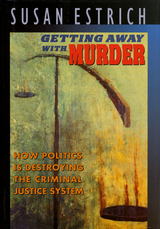
Americans rank crime among the most urgent of social concerns. Overflowing prisons and public outcry have led many to propose that the criminal justice system could control crime more effectively by focusing on dangerous offenders.
Recent social studies have suggested that serious criminality is highly concentrated and that high-rate offenders can be distinguished from others on the basis of prior criminal conduct, drug abuse, and employment record. Such studies urge judges to shift from rehabilitative sentencing to selective incapacitation, with longer prison sentences for convicted criminals who are deemed unusually dangerous. In response to these recommendations, some prosecutors' offices have established career criminal units designed to assure that repeat offenders will be prosecuted to the full measure of the law. Some police departments are experimenting with "perpetrator-oriented patrols" targeted on suspected high-rate offenders.
The authors of this major book in criminal jurisprudence describe and analyze the intellectual and social challenge posed to public officials by this new thrust in criminal justice policy. They develop a framework for evaluating policies that focus on dangerous offenders. They first examine the general issues that arise as society considers the benefits and risks of concentrating on a particular category of criminals. They then outline how that approach might work at each stage of the criminal justice system--sentencing, pretrial detention, prosecution, and investigation.
This cogently argued book provides much needed guidance on the crucial questions of whether sharpened attention to dangerous offenders is just, whether such a policy can be effective in managing the problem of crime, which applications seem particularly valuable, what the long-term risks to social institutions are, and what uncertainties must be monitored and resolved as the policy evolves.

Justice isn't blind. It's winking. This is the message Americans get when, against the weight of overwhelming evidence, high-profile suspects go free; when there are special sentencing rules for battered wives or adult survivors of childhood abuse; when murderers are released from prison to rape and murder again, and politicians make political hay out of these cases; when lawyers look less like servants of higher values and more like profit seekers reaping fortunes by helping clients get away with murder. This book is a penetrating look into what's wrong with the American legal system, a devastating critique of how politics has corrupted criminal law in America.
Written with clarity and simplicity, Getting Away with Murder is a lesson in how the law works and a blueprint for how it should work. Susan Estrich takes on the enflamed issues, from the O. J. Simpson trial to three strikes legislation, but pushes well beyond the soundbite answers. Drawing on her background as a lawyer, political commentator, professor, and national campaign manager for Michael Dukakis, she brings academic expertise and political experience together in a way that very few people can.
In particular, Estrich argues that group-based jury nullification, like group-based abuse excuses, is precisely the wrong answer to the biases of the criminal justice system. Getting Away with Murder also views this system in the wider political arena, where fiascoes like the Willie Horton case stifle political debate and promote policies that tie the hands of judges in dealing with dangerous offenders. Lawyers do not escape Estrich's notice; she directs some of her most pointed remarks at the failure of the legal profession to tend to the ethical duties and legal values that it professes.
At a time when three quarters of black Americans believe that the criminal justice system is racist and unfair; when nearly half of all whites think it's ineffective and in decline; when crime, though falling, still tops the list of public concerns, and politicians exploit public distrust of the system to get elected, Getting Away with Murder makes a statement that is powerful, controversial, and urgently needed.

READERS
Browse our collection.
PUBLISHERS
See BiblioVault's publisher services.
STUDENT SERVICES
Files for college accessibility offices.
UChicago Accessibility Resources
home | accessibility | search | about | contact us
BiblioVault ® 2001 - 2024
The University of Chicago Press









